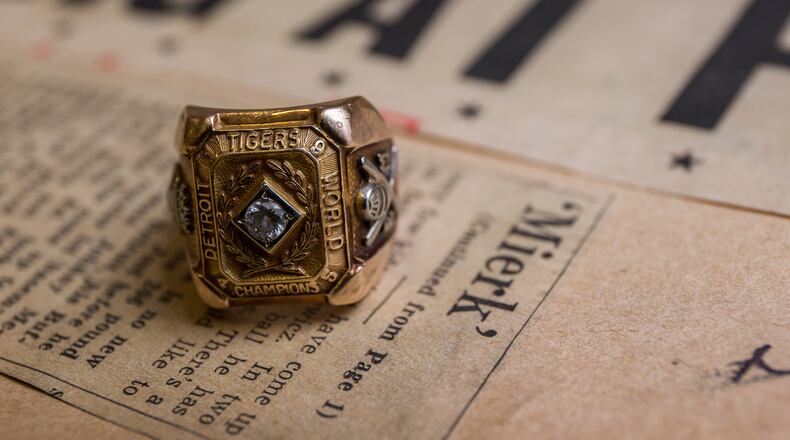His 6-foot-4 frame fills the bed, the rumpled sheets and blanket covering his bare feet. Ventilators hum. The weary moans of an elderly woman fill the hallway. Nurses, therapists and guests shuttle in and out of the room, a fabric curtain the only partition between Ed Mierkowicz and a new roommate.
A few days before, Mierkowicz, 91, fell at his apartment, injuring his hip, leg and left foot. His head is propped up on a mound of pillows in the Woodward Hills Nursing Center in the Detroit suburbs. He hopes the pain subsides so he can go back home.
Rivulets of blue veins wend through his wrinkled hands. His left ankle is swollen, his foot turned awkwardly to the side. When the physical therapist gingerly scoops his arms under Mierkowicz's leg to lift him from the bed, he howls in pain.
In the corner of the room is a heart-shaped box of chocolates - its cover decorated to look like a baseball - resting on a table next to a browning banana, a package of peanut butter crackers and a printout of the rehab center's menu.
Tacked to the bulletin board is a photocopied, black-and-white photo of a young baseball player wearing a Detroit Tigers cap and uniform.
It's a picture of a promising outfielder with a strong arm and good speed living out a boy's dream of playing for his hometown team. There's Mierkowicz 70 years ago, the same prominent nose and kind eyes.
It's a picture of the last remaining survivor of the 1945 Cubs-Tigers World Series.
A link to history
Tethers to the Cubs' last World Series experience are almost nonexistent. Mierkowicz is the only player left.
As the Cubs start spring training in Arizona, they enter the season in unfamiliar territory: the betting favorites to win major league baseball's championship. Buoyed by 2015's postseason, when they won a wild-card playoff game and a divisional series before losing the National League Championship Series, the Cubs enter this season with a talented core of players, a charismatic manager and high hopes of breaking their 108-year-old World Series drought.
The club was never closer to ending that streak than on Oct. 10, 1945, when one win separated it from a title for the first time since 1908.
In the visitor's dugout at Wrigley Field that day was Mierkowicz, a rookie reserve outfielder for the Tigers, who for the first six games of the World Series and eight innings of the seventh game, had watched the action like the 41,590 fans who packed the ballpark.
But with the Tigers holding a commanding 9-3 lead entering the bottom of the ninth, and aging star left fielder Hank Greenberg ailing, Mierkowicz suddenly found himself trotting out of the dugout and onto the Wrigley Field grass.
Since making his big league debut five weeks before, he played in only 10 games. Mierkowicz, who idolized Greenberg as a boy in Wyandotte, Mich., ran toward Wrigley's ivy-covered walls. He remembered his knees were shaking.
The Cubs' first batter in the bottom of the ninth, Roy Hughes, stepped in and promptly cracked one toward left field. It dropped in front of Mierkowicz, who fielded it cleanly and tossed it back to the infield.
Less nervous now with a play under his belt, his instincts kicked in. Mierkowicz was all business for the remainder of the inning, there to do what he had been focused on since he was a child hitting stones with a stick along the railroad tracks.
A strikeout, a flyout to center and a ground ball ended the inning, the game and the series. The Tigers defeated the Cubs, four games to three, prolonging a championship drought that lasts to this day.
Credit: (Zbigniew Bzdak/Chicago Tribune/TNS)
Credit: (Zbigniew Bzdak/Chicago Tribune/TNS)
After the final out, Mierkowicz ran in from left field, greeting his teammates with handshakes and hugs. The 21-year-old headed to the clubhouse with the veteran players, where they drank champagne and celebrated before boarding a train back to Michigan.
At the train station in Detroit, Tigers fans mobbed the returning players, Mierkowicz right in the middle of it all. At the championship banquet, the young rookie won the raffle for a new Chevrolet.
Mierkowicz was sent back to the minor leagues the next season. He was called up again in 1947, and played a few games for the Tigers in 1948 and one game with the St. Louis Cardinals in 1950. By 1958, his baseball career was over.
Mierkowicz played in 35 major league games. He hit .175, collecting three doubles, one home run and four RBIs during parts of four big-league seasons. He never made it to the plate in the World Series, but he was on the field for a championship.
When Mierkowicz skipped across the grass after the final out at Wrigley Field that autumn day, it was the last time the Cubs played in the World Series.
Taste of the big leagues
Seventy years later, at the rehab hospital, Mierkowicz retells the story of his place in baseball history. His hand mimics the flight of the ball on its trip to the outfield that October day, his eyes locked on its trajectory like the ball is still coming toward him.
"Just like it was yesterday," he says.
Those days were among the best, Mierkowicz says, back when his arms were strong and his legs were stronger.
"You look at that picture, and you're young," Mierkowicz said, pointing to the black-and-white photo of himself in his Tigers uniform. "Now, I'm an old man. Now, I can't walk. Back then I could run like hell."
He talks about the famous ballplayers and managers he once knew: Greenberg, Gabby Hartnett, Luke Appling, Billy Pierce. Greenberg once called out to him using a nickname - "Hey, Mierk!" he yelled - and it made Mierkowicz "feel like one of the boys."
When he made it onto the field in the World Series, Mierkowicz said he was determined to prove he belonged.
"I really wanted to play to just prove that I could," he said.
In the locker room after the win, "it was crazy. Just like now, but maybe on a smaller scale." Parts of that day he remembers clearly, others have faded.
He regrets that he didn't make a greater impact at the major league level, his competitiveness still evident as he talks about his best minor league games - he was a career .284 hitter over 13 years. "I was so close, yet so far away," he said. "It's something that you make it to the big leagues, and then it stops right there. I felt like I was a little better, or I could have played better to prove myself. And I didn't have the chance."
After his baseball career ended, he got married and had kids. He worked at a bar and as a mechanic and machinist in Wayne County, Mich.
"When I was through," Mierkowicz said. "I just lived a normal life."
In his spare time he liked to play golf, and he still enjoys following sports, especially baseball and the Tigers. He's never made it to a game at the Tigers' new ballpark, Comerica Park - "everything's a hassle" - preferring to watch on television.
It was sad when the demolition of Tiger Stadium wrapped up in 2009, he said, but "you can't stop progress."
When Lennie Merullo, the last remaining Cubs player from the 1945 Series, died last year, Mierkowicz became the lone surviving participant. He says he rarely thinks about it but is grateful for the attention.
"I'm surprised I'm the last one," he said. "I don't know if I'm lucky or what."
Mierkowicz shrugs when asked if he thinks it's remarkable that the last time the Cubs played in the World Series was the game he played in. It would be exciting for Cubs fans if they made it back, he says, but his loyalty is with the Tigers.
Still tenacious
A physical therapist who takes Mierkowicz through exercises describes him as tenacious.
"Ask him to give you 10 reps and he'd give you 20," the therapist says, patting Mierkowicz on his broad shoulders.
On a recent visit, the therapist says he'll come back the next day, when Mierkowicz's leg feels better.
Mierkowicz sighs deeply. He wiggles to get comfortable, closes his eyes and takes a deep breath.
His body ails but his mind is clear. His eyes are alert and alive despite his complaints about the aftermath of cataract surgery.
"Do the Red Wings play tonight?" he asks. They do not.
He talks about his brother, who died in a factory accident weeks before he was set to retire, and playing catch with his dad as a child. Playing ball with your kids, he says, those are the times that are important in life.
"The greatest thing you can give them is your love," he said. "Because it doesn't cost you a thing."
He chats more about his family, about spring training baseball, hockey and Big Ten basketball. He's happy for the company, to talk about something besides prescriptions and doctors.
Another therapist arrives, unaware of his patient's baseball connection. Told the man is Ed Mierkowicz, the last surviving player from the 1945 World Series, the therapist raises his eyebrows in surprise: "Oh, a big deal!"
When the interview is over, Mierkowicz reaches out his arm to shake hands, the long fingers that once wrapped around the handle of a bat now cool and bony.
"I appreciate that someone still remembers me," he said. "I'll never forget this in my life."
His eyes twinkle. And he smiles.
(c)2016 Chicago Tribune
Visit the Chicago Tribune at www.chicagotribune.com
Distributed by Tribune Content Agency, LLC.
About the Author
Keep Reading
The Latest
Featured




